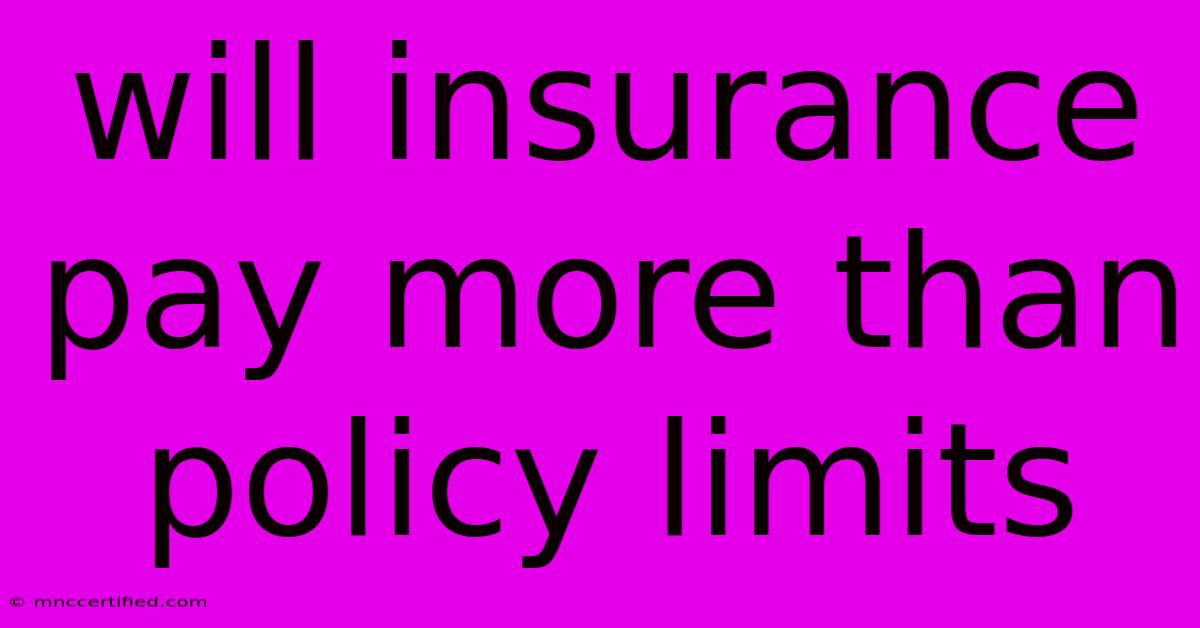Will Insurance Pay More Than Policy Limits

Table of Contents
Will Insurance Pay More Than Policy Limits? Understanding Your Coverage
When facing a significant accident or loss, you might wonder, "Will my insurance pay more than my policy limits?" The answer, unfortunately, is often no. Your insurance policy acts as a contract outlining the maximum amount your insurer will pay for covered events. But there are some scenarios where you might receive more than your policy limits.
Let's break down the complexities of insurance payouts and explore the exceptions to the rule.
The Importance of Policy Limits
Understanding your policy limits is crucial. These limits represent the maximum amount your insurance company will pay for a specific type of claim, such as:
- Liability Coverage: Covers damages to others (property or injuries) if you're found at fault in an accident.
- Medical Payments Coverage: Covers medical expenses for you and passengers in your vehicle, regardless of fault.
- Collision Coverage: Covers damages to your vehicle in an accident, regardless of fault.
- Comprehensive Coverage: Covers damages to your vehicle due to events other than collisions, such as theft, vandalism, or natural disasters.
Exceeding your policy limits can leave you financially vulnerable. This means you'll be responsible for any costs beyond the limit, which can be substantial.
When You Might Get More Than Your Policy Limits
While exceeding your policy limits is uncommon, there are a few scenarios where it might happen:
- Underinsured/Uninsured Motorist Coverage: If you're involved in an accident with someone who has inadequate or no liability insurance, your underinsured/uninsured motorist coverage can step in to cover the remaining costs. This coverage usually has its own limits, but it can help protect you from significant financial burdens.
- Stacking Coverage: Some insurance policies allow you to stack multiple policies together, increasing your coverage limits. For example, if you have multiple vehicles covered under the same policy, you might be able to stack the liability limits for each vehicle. However, this depends on the terms of your policy and state regulations.
- Additional Coverage: Certain additional coverages, like personal umbrella insurance, can offer higher limits beyond your standard policy. This can provide extra protection in cases of significant claims, but it comes at an additional cost.
- Legal Settlement: If you're involved in a legal dispute with the other party, a court might rule in your favor and award a settlement amount exceeding your policy limits. However, your insurer is ultimately only obligated to pay up to the policy limit. This means you may have to pursue the remaining amount directly from the at-fault party or their insurer.
- Good Faith Negotiation: Occasionally, insurance companies may negotiate settlements that exceed policy limits. This might occur if the insurer believes it's in their best interest to resolve a claim quickly and avoid lengthy legal battles.
Understanding Your Policy is Key
The best way to ensure you're adequately protected is to carefully review your insurance policy and understand your coverage limits. Consult with your insurance agent to discuss your specific needs and explore options for increasing your coverage if necessary.
Remember, prevention is key. Staying informed about your policy and maintaining appropriate coverage can provide peace of mind and financial protection in unexpected circumstances.

Thank you for visiting our website wich cover about Will Insurance Pay More Than Policy Limits. We hope the information provided has been useful to you. Feel free to contact us if you have any questions or need further assistance. See you next time and dont miss to bookmark.
Featured Posts
-
Bitcoin Price Forecast Trump Victory And 78 000 Upside
Nov 07, 2024
-
California Voters Approve Prop 36 Reversing Laws
Nov 07, 2024
-
Do You Need Insurance To Get An Inspection
Nov 07, 2024
-
Handmaids Tale 1984 See Sales Spike
Nov 07, 2024
-
Champions League Barcelona Vs Estrella Roja Live Stream
Nov 07, 2024